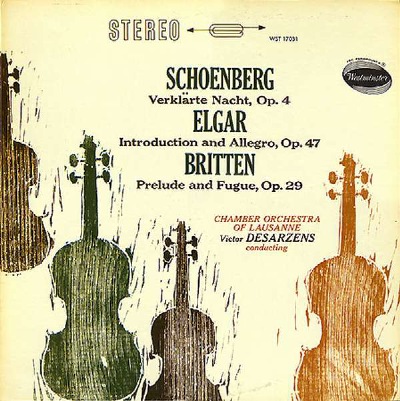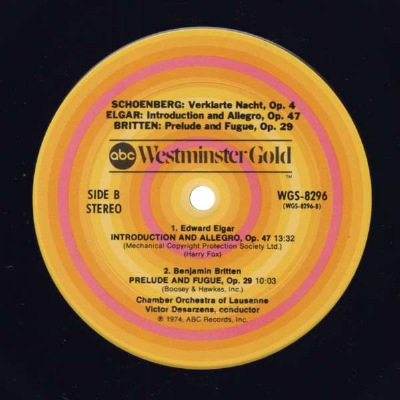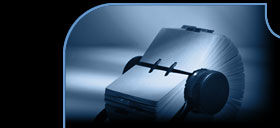 | 
Edward ELGAR, Introduction et allegro, Op. 47, Orchestre de Chambre de Lausanne, Victor DESARZENS, septembre 1961, Westminster WST-17031
Cet enregistrement peut être également écouté en ligne sur la page correspondante du site www.notrehistoire.ch. Le logiciel Adobe Flash Player doit toutefois être installé sur votre ordinateur pour pouvoir écouter le fichier.
 Edward Elgar compose cette oeuvre en 1905, il la dédicace au professeur Samuel Sanford, de l'université Yale. Elle est composée pour quatuor à cordes et orchestre à cordes: l'oeuvre reprend la structure classique du concerto grosso avec un quatuor soliste (le concertino) conversant avec le reste de l'effectif (le ripieno). Son introduction est inspirée par un thème folklorique gallois, 'Welsh tune', un thème qu'Elgar avait noté en août 1901 lors d'un séjour à Cardiganshire, West Wales. Edward Elgar compose cette oeuvre en 1905, il la dédicace au professeur Samuel Sanford, de l'université Yale. Elle est composée pour quatuor à cordes et orchestre à cordes: l'oeuvre reprend la structure classique du concerto grosso avec un quatuor soliste (le concertino) conversant avec le reste de l'effectif (le ripieno). Son introduction est inspirée par un thème folklorique gallois, 'Welsh tune', un thème qu'Elgar avait noté en août 1901 lors d'un séjour à Cardiganshire, West Wales.
La première a lieu le 8 mars 1905 avec l'Orchestre Symphonique de Londres sous la direction du compositeur, dans un concert entièrement consacré à ses oeuvres.
Une courte description extraite du texte publié au verso de la pochette du disque:
"[...] Before he aspired to be either interpretative or creative musician, Edward Elgar grew to know the sound of the violin in his own home, from his music-dealerorganist-chamber-enthusiast father. It was inevitable, perhaps, that he would one day combine the string quartet and the string orchestra into a concerto grosso relationship, but not that the results should be dedicated to Professor S. S. Stanford of Yale University. This came about in the aftermath of a visit by Elgar to the United States in 1904, to accept an honorary doctorate in New Haven.
Following the assertive opening, the members of the solo quartet take off on rhapsodic flights which define the temper of the music to come. Lengthiest and most meaningful of them is from the solo viola, picked up and elaborated by the full string group. In Elgar's tenderest, most contemplative vein, this phrase is extended at some length before a reprise of the opening makes way for the allegro. In the course of a sonata-form sequence, other elements of the introduction are called upon. However, in the fugal episode which takes the place of a development, a new motive not previously heard is utilized. When it has run its course, the beautiful opening theme rires from the deep bars strings and is given an ennobling expansion. With a full senne of the appropriate, Elgar saves the viola musings from the introduction to the coda, after a brilliant treatment of the broad rhythmic material of the opening. [...]" citation extraite du texte de Irving Kolodin publié au verso de la pochette du disque WGS-8296.
Pour plus de détails sur l'oeuvre voir par exemple la page en anglais de Wikipedia.
La partition peut être librement téléchargée sur la page correspondante du site de l'IMSLP.
Dans l'enregistrement que je vous propose sur cette page Victor DESARZENS dirige son orchestre, l'Orchestre de Chambre de Lausanne. L'enregistrement a été fait en septembre 1961 (*) pour la maison de disques Westminster et est paru la même année (**) en monophonie sur le disque XWN-19031 et en stéréophonie sur le disque WST-17031. Il a été réédité dans les années 1970 entre autres sur les disques Westminster Gold WGS-8296 et Music Guild MS-811. Sur la première face du disque se trouve l'opus 4 - Nuit transfigurée - d'Arnold Schoenberg, sur la deuxième face cette oeuvre d'Elgar et l'opus 29 - Prélude et fugue - de Benjamin Britten.
(*) datation mentionnée au verso de la pochette du disque.
(**) selon le catalogue de la Library of Congress de Washington.
C'est - à ma connaissance - le seul enregistrement d'une oeuvre d'Edward Elgar sous la direction de Victor Desarzens. J'ignore toutefois si la décision d'enregistrer cette oeuvre vient de la maison de disques Westminster, ou de Victor Desarzens: si quelqu'un devait en savoir plus, tout renseignement m'intéresse, afin de pouvoir mieux documenter cette page -> Vos remarques!
Mon disque WST-17031 est en assez bon état, la restauration n'a pas été très difficile. Voici donc...
Edward Elgar, Introduction and allegro, Op. 47, Orchestre de Chambre de Lausanne, Victor Desarzens, septembre 1961, Westminster WST-17031 (13:36)
que je vous offre et que vous pouvez obtenir en...
______________________________CLIQUANT_ICI______________________________
pour un download libre, sur mon site
 Westminster WST-17031 -> WAV -> léger à moyen DeClick avec ClickRepair, des réparations manuelles -> FLAC Westminster WST-17031 -> WAV -> léger à moyen DeClick avec ClickRepair, des réparations manuelles -> FLAC
1 fichier FLAC, 2 fichiers CUE (*) et 1 fichier PDF dans 1 fichier ZIP
(*) 1 fichier CUE pour les fichiers décomprimés en WAV et 1 fichier CUE pour les fichiers comprimés FLAC, si votre logiciel peut utiliser directement les fichiers FLAC.
Ci-contre: l'étiquette du disque WGS-8296, réédité en 1974.
|  |

